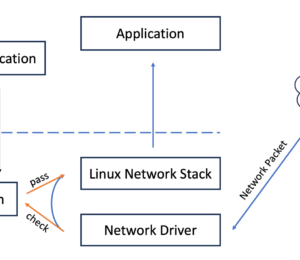Hello eBPF: First steps with libbpf (5)
- March 07, 2024
- 3697 Unique Views
- 4 min read
Welcome back to my blog series on eBPF. Two weeks ago, I showed you how to write your own eBPF application using my hello-ebpf library based on libbcc. This week, I show you why using libbcc is not the best idea and start working with the newer libbpf.
With my current libbcc-based approach, we essentially embed the executed eBPF program into our programs as a string into our applications and compile them on the fly for every run:
public class HelloWorld {
public static void main(String[] args) {
try (BPF b = BPF.builder("""
int kprobe__sys_clone(void *ctx) {
bpf_trace_printk("Hello, World!");
return 0;
}
""").build()) {
b.trace_print();
}
}
}
Problems with Libbcc
Using libbcc and porting the Python wrapper made it easy to start developing a user-land Java library and offers some syntactic sugar, but it has major disadvantages, to quote Andrii Nakryiko:
BPF Portability and CO-RE by Andrii Nakryiko
- Clang/LLVM combo is a big library, resulting in big fat binaries that need to be distributed with your application.
- Clang/LLVM combo is resource-heavy, so when you are compiling BPF code at start up, you'll use a significant amount of resources, potentially tipping over a carefully balanced production workfload. And vice versa, on a busy host, compiling a small BPF program might take minutes in some cases.
- BPF program testing and development iteration is quite painful as well, as you are going to get even most trivial compilation errors only in run-time, once you recompile and restart your user-space control application. This certainly increases friction and is not helping to iterate fast.
Additionally, the libbcc binaries in the official Ubuntu package repositories are outdated, so we're accumulating technical debt using them.
BPF-based Library
So what is the alternative? We compile the embedded C code in our application to eBPF bytecode at build time using a custom annotation processor and load the bytecode using libbpf at run-time:

This allows us to create self-contained JARs that will eventually neatly package our eBPF application.
With this new chapter of the hello-ebpf project, I am trying to create a proper Java API that
- builds on top of libbpf
- isn't bound to mimic the Python API, thus making it easier to understand for Java developers
- is tested with a growing number of tests so that it is safe to use
- prefers usability (and a small API) over speed
The annotation processor for this lives in the bpf-processor, and the central part of the library is in the bpf folder. It is in its earliest stages, but you can expect more features and tests in the following months.
HelloWorld Example
Writing programs with libbpf is not too dissimilar to using my libbcc wrapper:
@BPF // annotation to trigger the BPF annotation processor
public abstract class HelloWorld extends BPFProgram {
// eBPF program code that is compiled at build
// time using clang
static final String EBPF_PROGRAM = """
#include "vmlinux.h"
#include <bpf/bpf_helpers.h>
#include <bpf/bpf_tracing.h>
SEC ("kprobe/do_sys_openat2")
int kprobe__do_sys_openat2(struct pt_regs *ctx){
bpf_printk("Hello, World from BPF and more!");
return 0;
}
char _license[] SEC ("license") = "GPL";
""";
public static void main(String[] args) {
// load an instance of the HelloWorld implementation
try (HelloWorld program = BPFProgram.load(HelloWorld.class)) {
// attach to the kprobe
program.autoAttachProgram(
program.getProgramByName("kprobe__do_sys_openat2"));
program.tracePrintLoop(f ->
String.format("%d: %s: %s", (int)f.ts(), f.task(), f.msg()));
}
}
}
Running this class via ./run_bpf.sh HelloWorld will then print the following:
3385: irqbalance: Hello, World from BPF and more! 3385: irqbalance: Hello, World from BPF and more! 3385: irqbalance: Hello, World from BPF and more! 3385: irqbalance: Hello, World from BPF and more! 3385: irqbalance: Hello, World from BPF and more! 3385: irqbalance: Hello, World from BPF and more! 3385: irqbalance: Hello, World from BPF and more! 3385: C2 CompilerThre: Hello, World from BPF and more!
The annotation processor created an implementation of the HelloWorld class, which overrides the getByteCode method:
public final class HelloWorldImpl extends HelloWorld {
/**
* Base64 encoded gzipped eBPF byte-code
*/
private static final String BYTE_CODE = "H4sIAA...n5q6hfQNFV+sgDAAA=";
@Override
public byte[] getByteCode() {
return Util.decodeGzippedBase64(BYTE_CODE);
}
}
Compiler Errors
But what happens when you make a mistake in your eBPF program, for example, not writing a semicolon after the bpf_printk call? Then, the annotation processor throws an error at build-time and prints the following error message when calling mvn package:
Processing BPFProgram: me.bechberger.ebpf.samples.HelloWorld
Obtaining vmlinux.h header file
Could not compile eBPF program
HelloWorld.java:[19,66] error: expected ';' after expression
bpf_printk("Hello, World from BPF and more!")
^
;
1 error generated.
The annotation processor compiles the eBPF program using Clang and post-processes the error messages to show the location in the Java program. Using libbcc, we only get this error at run-time, which makes finding these issues far harder.
Conclusion
Using libbpf instead of libbcc has many advantages: Smaller, self-contained JARs, better developer support, and a more modern library. The hello-ebpf project will evolve to focus on libbpf to become a fully functional and tested eBPF user-land library. Using an annotation processor offers so many possibilities, so stay tuned.
Thanks for joining me on this journey to create a proper Java API for eBPF. I'll see you in two weeks for the next installment in this series, and possibly before for a trip report on my current travels.
This article is part of my work in the SapMachine team at SAP, making profiling and debugging easier for everyone, first published on my personal blog mostlynerdless.de. This article was written in Canada, thanks to ConFoo and Theresa Mammarella, who made this trip possible. Inspiration came from Ansil H's series on eBPF.

Don’t Forget to Share This Post!









Comments (0)
No comments yet. Be the first.